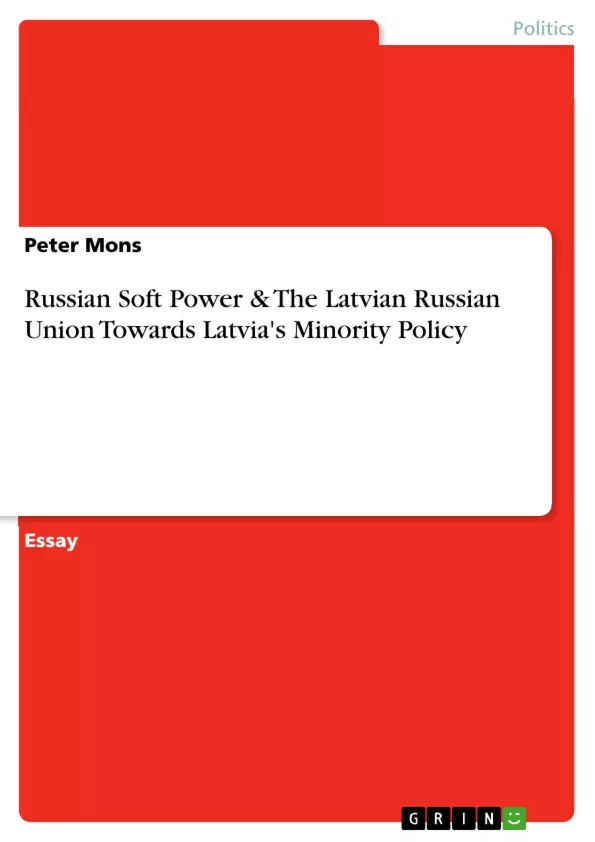After its reestablished independence, Latvia decided to follow western ideals and transformed to a liberal, market based democracy. Nowadays the country is a member of the European Union and NATO. Among the three Baltic countries, Latvia was the Soviet Republic with the highest share of ethnic Russian population. Although the Latvian constitution allows national minorities the preservation of their culture, language and religion, an ongoing conflict in the society is visible: The Russian minority does not feel to be a partner on eye level, unwanted and partly excluded from governmental contribution. A pool of disintegrated that could be absorbed by others, containing the potential for social unrest.
Inhaltsverzeichnis (Table of Contents)
- Russian Soft Power & the Latvian Russian Union Towards Latvia's Minority Policy
- Soft Power - A Complex Tool
- A Complex Relationship - The Latvian Russian Union
- A History of Conflict
- The Use of Soft Power
- Consequences of Soft Power
Zielsetzung und Themenschwerpunkte (Objectives and Key Themes)
This text analyzes the use of soft power by the Russian Federation to influence the Latvian Russian Union and its role in shaping Latvia's minority policy. It examines the historical and political context of the relationship between Russia and Latvia, particularly focusing on the influence of the Russian minority within Latvia and its potential for social unrest.
- Russian Soft Power
- Latvian Russian Union
- Minority Policy in Latvia
- Historical Conflicts and Tensions
- Geopolitical Stability in the Baltic Region
Zusammenfassung der Kapitel (Chapter Summaries)
- This chapter introduces the context of Latvia's minority policy and the role of the Russian minority, highlighting the potential for social unrest and the influence of Russian soft power.
- This chapter delves into the concept of soft power, defining its key elements and exploring its potential uses, including both constructive and destructive applications.
- This chapter focuses on the Latvian Russian Union, examining its history, goals, and its connection to Russian foreign policy. It explores the potential for this party to address minority interests while aligning with Russian objectives.
- This chapter examines the historical relationship between Latvia and Russia, tracing the roots of the conflict and analyzing the impact of Soviet rule on Latvian identity and memory.
- This chapter explores the specific ways in which Russia has employed soft power to influence events in Latvia, focusing on language policies, cultural initiatives, and efforts to undermine Latvia's pro-Western stance.
- This chapter examines the consequences of Russian soft power on Latvian society, specifically considering the ongoing citizenship conflict, the language referendum of 2012, and the impact on Latvia's geopolitical stability.
Schlüsselwörter (Keywords)
This text focuses on the concepts of soft power, minority rights, historical conflict, ethnic identity, cultural influence, and the role of the Latvian Russian Union. It explores the complex relationship between Russia and Latvia, examining the potential for Russian soft power to influence Latvian politics and society.
Frequently Asked Questions
What is the focus of the study on Latvia's minority policy?
The study analyzes how Russian soft power influences the Latvian Russian Union and impacts the integration of the Russian minority in Latvia.
How is "Soft Power" defined in this context?
Soft power is a complex tool used to influence society through culture, language, and political initiatives rather than military force.
Why is the Russian minority in Latvia a sensitive issue?
Latvia has a high share of ethnic Russians from the Soviet era. Many feel excluded from governmental contribution, creating potential for social unrest.
What was the significance of the 2012 language referendum?
The referendum is analyzed as a consequence of soft power and ongoing conflicts regarding citizenship and national identity in Latvia.
What role does the Latvian Russian Union play?
The party attempts to address minority interests while often aligning with the foreign policy objectives of the Russian Federation.
- Citar trabajo
- Peter Mons (Autor), 2021, Russian Soft Power & The Latvian Russian Union Towards Latvia's Minority Policy, Múnich, GRIN Verlag, https://www.grin.com/document/991300



